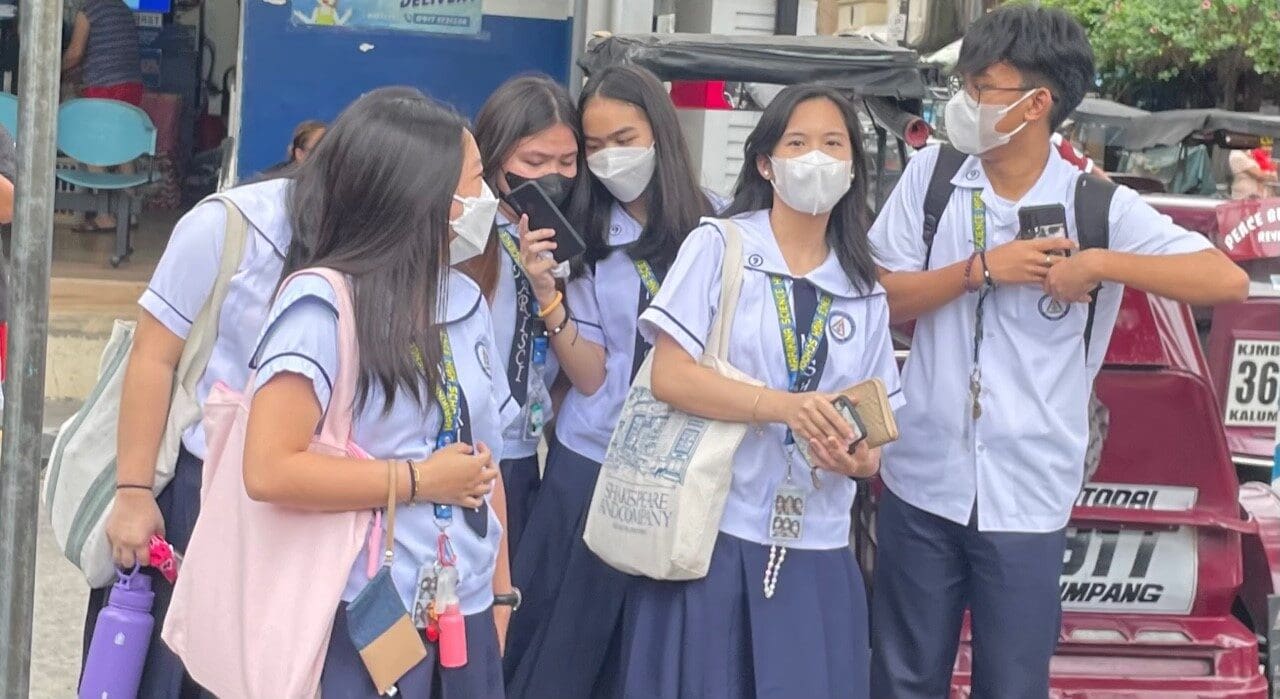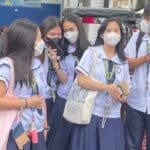AND why did Philippines chose Independence over US Statehood?

National politics here can turn deadly.
[1]Clark Air Force Base
[2]Subic Bay Naval Reserve
Manila, Republic of Philippines–Public Education is the future for most school-aged students in this capital and population center of the country where West meets East. Filipino people have contributed to Alaska for decades as the largest immigrant population in this state after immigrants from the United States.
[3]Filipinos in Alaska*

Given the fact Philippines is considered overpopulated by western standards, some might wonder why people in this 3rd World Nation continue to have large families. Fact is, family represents the foundation of Filipino culture–which remains largely Catholic as a result of their more than 300 years of hostile occupation by Spain.
[4]Top Populated Cities of the world
Today Philippines has an estimated 113 million people in an archipelago having 300,000 square kilometers of land over more than 7,400 islands–an area slightly larger than Alaska’s North Slope, which only had a population of 11,031 in the 2021 census.
[5]Population Growth in Philippines
But, when the United States took over the Philippines under terms of the Treaty of Paris (1898) Filipinos fought back.
[5]A history of the Philippines
These proud people are polite, accommodating to a fault, and fiercely independent. I have known this to be true in my acquaintances with many who live in Alaska.

A History of Struggle
I have not heard a single vulgarity since being here, where a fresh haircut appears to be the favored look of young Filipino men.

Philippines’ rich history of struggle and determination has required Filipino people to keep asking their politicians to be accountable. Recurring corruption has been a theme of nearly every one of the 17 presidential campaigns since Gen. Emilio Famy Aguinaldo led a sucessful uprising to become Comander-in-Chief of the Philippine Revolutionary Army. Aguinaldo won election as the first President by secret ballot March 22, 1897. Philippine Independence was declared in Kawit, Cavite on June 12, 1898.
[6]The Philippine Presidents and Other Nation Builders
Meanwhile, as Aguinaldo was laying down foundations of an independent government, a US armada led by Commodore George Dewey was on its way to Manila. They easily destroyed the Spanish naval fleet in the Battle of Manila Bay on April 30, 1898.
The first Phillipine Republic–the first republic in Asia–was inaugrated on January 23, 1898 at Barasoain Church. On February 4, 1899, war broke out between the Philippines and the U.S. where Filipinos resorted to guerilla tactics in the face of the better-equipped US forces.
[7]Ibid.
This was the prelude to the U.S.-Led Vietnam War Disaster
Aguinaldo is the George Washington of the Philippines but the road from there has been much different than the US/Alaska dance of dependency. Renewed Revolutionary governments have been required in Philippines on several occasions to assert their national independence and moral authority.
Scandalously, Thomas Jefferson once wrote to James Madison, “I hold it that a little rebellion now and then is a good thing, and is as necessary in the political world as storms in the physical.”
[8]The Imaginative Conservative
One test of this Jefferson proposal occurred with election of Ferdinand Marcos as 10th Philippines President.

[9]Financial Times: The Ghost of Marcos looms over a pivotal Philippine election
Between 1965-1986, President Marcos went from ruling a Republic under the 1935 Constitution to declaring Martial Law in September 1971–an unprecedented action in peacetime–reportedly to “save the Republic and to reform our society.” Mass media was censored and personalities who opposed Marcos and his policies were jailed. Constitution was suspended, Congress abolished, and Marcos became a chief executive with lawmaking powers, ultimately gaining a third term as President.
This crashed the economy and triggered a People Power movement that swept Corazon C. Aquino into office as 11th President of the Republic of Philippines. Aquino was the widow of martyred political opponent of Marcos, Benigno Simmeon C. Aquino II, who was assassinated by his own security detail when disembarking from a plane arriving from the USA.
[10]Stewards of the Nation

11th Philippines President, Corazon C. Aquino, 1933-2009…
American fingerprints are all over everything Marcos did from the time U.S. President Lynden B. Johnson engaged the Philippine strong-man to help justify the U.S. War in Vietnam. Five successive U.S. Presidents supported the Marcoses with little or no restraint exercised: Johnson, Richard Nixon, Gerald Ford, Jimmy Carter and Ronald Reagan. On the occasion of his visit to Manila in 1981, Vice-President George H.W. Bush (Former Director of the US Central Intelligence Agency) toasted Marcos by saying with a straight face: We love your adherence to democratic principles and to the democratic process.
Some Filipinos were astounded at this duplicity.

[11]History of the Philippines
Upon election Aquino’s challenges were profound: The ravages wrought by the Marcos administration defied fast solutions: a bankrupt economy, a huge foreign debt, continuing foreign dependence, a corrupt bureaucracy, massive poverty, a restless military, a metropolis in disorder.
[12]The Philippine Presidents and Other Nation Builders
Aquino was required to form a Constitutional Commission to change the political system that had allowed Ferdinand and Imelda Marcos–in what was referred to by some as a conjugal dictatorship–back to a Presidential system from a Parliamentary system of governance. A new constitution was ratified by the people in a plebiscite on February 2, 1987.
[13]Ibid
A total of six coup attempts were foiled during Aquino’s term. Two of them however nearly toppled her from office. At one point she required resignation of her entire cabinet.
Old Plan out of New Cloth
The only son of Cory Aquino, Benigno Simmeon C. Aquino III, ran and was elected 15th President of Philipines from 2010 to 2016. Aquino stressed he would push for H-I-T–Honesty, Integrity, Truthfulness–and in his last State of the Nation Address on January 20, 2015 Aquino detailed the extensive corruption his administration had identified and stopped. Numerous violators of the public trust were prosecuted.
Public Education Upgrade
During Aquino’s tenure the country’s education system underwent a major change with adoption of the K-12 program to increase the basic education cycle from 10 to 12 years. This alligns the country’s education cycle with the world standard.
[14]ibid P-138.
During this time good economic trends improved GDP growth rate to the highest rate experienced by any President since the 1950s. After strident opposition from the Catholic Church and allied groups, the Reproductive Health Law allowing distribution of contraceptives through government health units and NGOs was passed in an attempt to address over-population.
Attacking the Demons of Drug Use and Addiction
Initially seen as a long-shot during the election, former prosecuter and populist Mayor from Davao City, 16th Philippine President Rodrigo Roa Duterte declared upon election: The country’s ills are mere symptoms of a virulent social disease that creeps and cuts into the moral fiber of Philippine society. I see the erosion of the people’s trust in our country’s leaders, the erosion of faith in our justice system, the erosion of confidence in the ability of our public servants to make the people’s lives better, safer, and healthier.”
That message and Dutarte’s “what you see is what you get” personna confounded political pundits and well-funded rivals. In the face of the Covid-19 Pandemic, Dutarte delivered on all fronts–leaving office with the highest approval rate of any President at the end of their term.
[15]Ibid, P-143, 146-147
President Duterte launched a war on drugs in which a number of drug lords were jailed and local officials alleged to be involved in the drug trade executed. In the course of this campaign some 6,000 were killed according to official data. A government report says some P63.43 billion of illegal drugs were taken off the street between July 1, 2016 and Feb 28,2022. Some 331,694 individuals were arrested.
[16]Ibid, P-151
Again, a stark contrast with Alaska where legalization of marijuana has flooded our state with cannabis dispensaries.
But the high point of President Dutarte’s accomplishments can be seen now all over the country. A total of 212 projects worth P4.7-trillion are included in his Build, Build Build Initiative.
[17]Ibid, P- 152
A Country at Peace with Itself
Everywhere this writer has visited in Philippines is vibrant, everybody is busy and in the security forces are visible at appropriate places. Manila area traffic is crazy, with minimum signage or lights. Sometimes it appears that all drivers are daring each other to hit them, but I have not seen a single example of road rage or auto accident.
Children are everwhere while parents try to make a living any legal way they can.
There’s something wholesome about how this place works and Vice-President under President Ferdinand Marcos, Jr.–daughter of former Pres. Dutarte, Sara Z. Dutarte–is also head of the Philippine Department of Education.
Meaningful public education is a priority for the Filipino people.

NEXT: A 30-Year Filipina Teacher & School Principal explains how government schools work here.
References:
[1]Clark Air Base
https://en.wikipedia.org/wiki/Clark_Air_Base
[2]Subic Naval Base
https://en.wikipedia.org/wiki/U.S._Naval_Base_Subic_Bay
[3]Filipinos in Alaska
https://en.wikipedia.org/wiki/Filipinos_in_Alaska
People ofFilipinodescent represent the largestAsian Americansubgroup in theState of Alaska.[1]Filipino seamen are recorded as having contact withAlaska Nativesas early as 1788, and Filipino immigrants continued to arrive as workers in Alaska’s developing natural resource industries: as sailors on American whaling ships; as ore sorters for gold mines inJuneauandDouglas Island; and as salmon cannery workers (calledAlaskeros).[2]:”Šx”ŠAlaska’s Filipino community has a long history of interaction and intermarriage with Alaska Native communities, and manyFilipinos in Alaskaalso claim Alaska Native heritage.
In 2014, Filipinos made up 52% of Alaska’s Asian and Pacific Islander population.[1]In 2010, they represented 2.7% of Alaska’s total population.[3]Filipino Americans are the largest racial minority in the city ofAnchorage, and also have large numbers in theAleutiansandKodiak Island.
[4]Largest cities in the world
[5]Population Growth in Philippines
[6] A history of the Philippines, Luis H Francia, Abrams Press,195 Broadway, New York, NY10007, 2010, P-10
Though founded in 1898, the republic had seen its flowering delayed because of two wars: the Spanish-American War, which the United States won handily; and the subsequent 1899 Philippine-American War, when the revolutionary government under General Emilio Aguinaldo refused to accept its role as booty for the Americans. It was a brutal conflict that lasted a decade and resulted in U.S. occupation for half a century.
[7]The Philippine Presidents and Other Nation Builders, Rosario P.Nem Singh, Isa-Jecho Publishing, Inc., 2022 P-6
[8]Ibid P-8,9
[9]The Imaginative Conservative
https://theimaginativeconservative.org/2022/01/little-rebellion-now-and-then-thomas-jefferson-clyde-wilson.html#:~:text=Scandalously%2C%20Thomas%20Jefferson%20once%20wrote,as%20storms%20in%20the%20physical.%E2%80%9D
[10] Financial Times: The Ghost of Marcos looms over a pivotal Philippine election https://www.ft.com/content/22a201b7-b0d5-49c3-8bb5-0dc848f0fead
[11]Stewards of the Nation, J. Eduardo Malaya, Jonathan E. Malaya, Anvil Publishing, Inc., 7/F Quad Alpha Centrum, 105 Pioneer St., Mandaluyong City, 1550 Phillipines, P-232.
[12]History of the Philippines, P-236
[13]The Philippine Presidents and Other Nation Builders, P-83
[14]Ibid P-84.
[15]Ibid, P-138
[16]ibid, P 146-147
[17]Ibid, P-151
[118]Ibid P-152




